Room of Angiography

Chief of the Room
Dmitry I. Yurlevich
Phone: +375 (17) 277-31-08
Staff room: +375 (017) 207-98-29
E.mail: Адрес электронной почты защищен от спам-ботов. Для просмотра адреса в вашем браузере должен быть включен Javascript., Адрес электронной почты защищен от спам-ботов. Для просмотра адреса в вашем браузере должен быть включен Javascript.
(cardiology, cardiac surgery, consultations by a cardiologist, general practitioner, arrhythmologist, cardiac surgeon and surgeon)
The staff of the room of angiography includes experienced and highly-qualified cardiologists, endovascular surgeons, electrophysiologists, specialists in external pacing and minimally invasive cardiac surgery. Many of them took trainings at the leading centers for cardiac surgery of the CIS and western countries (Moscow, Hannover, Ontario, Vilnius).
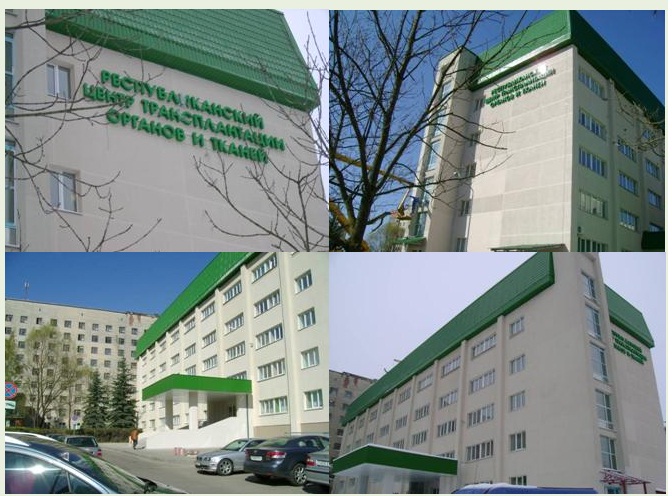
The specialists of the department of endovascular surgery deal with cardiac arrhythmias, coronary pathology, congenital and acquired problems with cerebral, visceral and peripheral vessels, which are hard to diagnose and are resistant to usual drug treatment. The staff of the department examine and consult patients, verify pre-operative diagnoses and indications for surgery, carry out minimally invasive endovascular catheter procedures with a view to determining a correct diagnosis or carrying out prescribed treatment (angioplasty, stenting, aneurysm or bleeding embolization, chemical embolization of tumors, implantation of a pacemaker, cardioverter defibrillator or cardiac resynchronization therapy device, transhepatic venous shunting in case of portal hypertension, etc. ). Besides, they follow up the patients with permanent pacemaker, ICDs and CRTs and regularly program the devices.
The activities are carried out in accordance with the evidence-based medicine and guidelines of the European Society of Cardiology, American Association of Cardiology and the standards of the Ministry of Health of the Republic of Belarus and the Ministry of Health of the Russian Federation. The state-of-the-art medical equipment and latest healthcare developments and findings are used.
The equipment of the department is used to diagnose and treat cardiovascular disorders:
- Toshiba Infinix CS-I biplane fluoroscopy angiographic unit;
- AutoCAT2WAVE intra-aortic balloon pump;
- Medrad contrast media injector;
- Fysicon vital signs monitor;
- Zoll external pacemaker;
- Medtronic, St. Jude software for adjustment and verification of pacemakers, ICDs, CRTs and loop recorders.
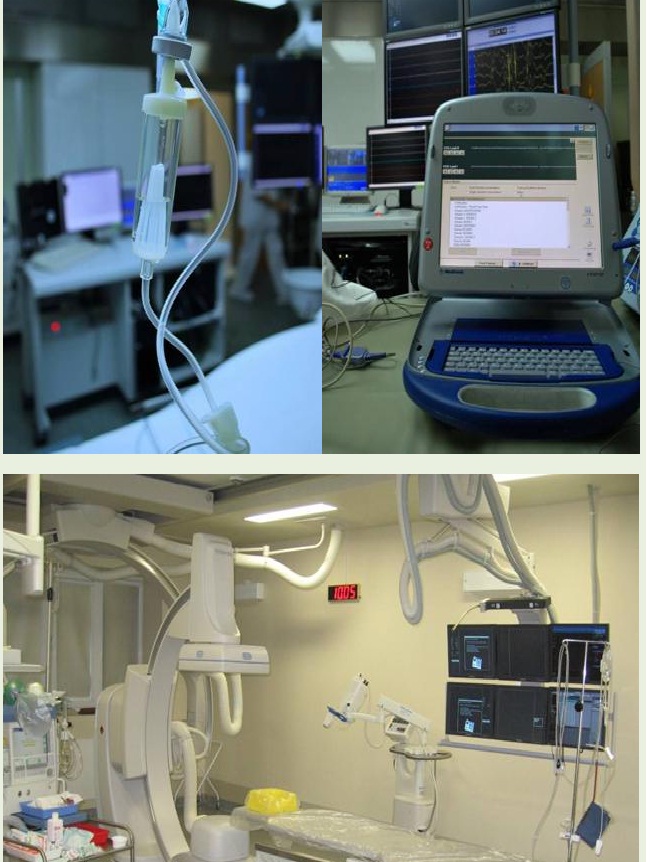
Before surgery, the following diagnostic procedures may be performed: ECG, transthoracic or transesophageal echocardiography, Holter monitoring, ultrasound examination of major vessels, in particular, brachiocephalic arteries, measurement of renal function, assessment of the state of adrenal glands, X-ray, computed tomography and magnetic resonance tomography.
Professor V.V. Makeev, PhD in Medicine, is one of the leading specialists in cardiac pacing and arrhythmology. He participates in the activities of the room of angiography and provides consultation.
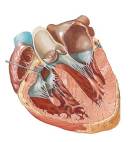 Our surgeons carry out implantation of pacemakers (in case of bradicardia), cardiac resynchronization therapy device (in case of chronic heart failure) and cardioverter defibrillators (in case of ventricular tachycardia or risk of ventricular tachycardia).
Our surgeons carry out implantation of pacemakers (in case of bradicardia), cardiac resynchronization therapy device (in case of chronic heart failure) and cardioverter defibrillators (in case of ventricular tachycardia or risk of ventricular tachycardia).
If antiarrhythmic therapy is not effective enough to facilitate ventricular tachycardia or ventricular fibrillation, or if a radical correction cannot be done, a cardioverter defibrillator is usually implanted. Implantable cardioverter defibrillators protect patients from a sudden cardiac death in 97% of cases (at least within first 2 years after implantation). They are also used to treat paroxysmal ventricular tachycardia. Latest generation implantable cardioverter defibrillators, which have supraventricular and ventricular tachyarrhythmia detection system, are used to treat all life-threatening types of arrhythmias.
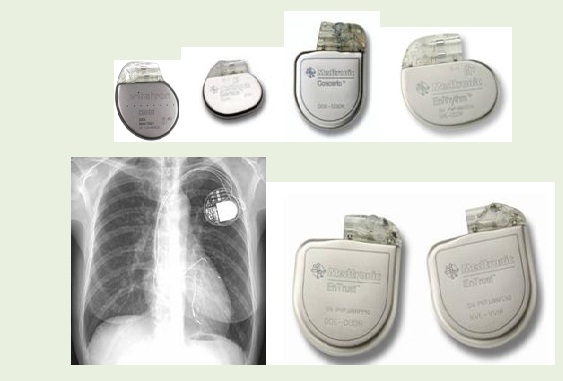
Other services:
- implantation of temporary pacing leads;
- implantation of a loop ECG recorder;
- programming and adjustment of implanted devices;
- consultation on any issues relating to arrhythmia or cardiac disorders.
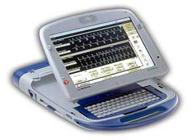 Cardiac pacing is the only effective treatment of bradicardia. Implantable cardiac pacemakers are the outstanding invention of the 2nd half of the 20th century (the first cardiac pacemaker was implanted in 1958). Daily cardiac pacemakers save life of at least 1 million of people all over the world. They ensure n adequate heart rate depending on the situation, i.e. at rest, during emotional state or physical activity.
Cardiac pacing is the only effective treatment of bradicardia. Implantable cardiac pacemakers are the outstanding invention of the 2nd half of the 20th century (the first cardiac pacemaker was implanted in 1958). Daily cardiac pacemakers save life of at least 1 million of people all over the world. They ensure n adequate heart rate depending on the situation, i.e. at rest, during emotional state or physical activity.
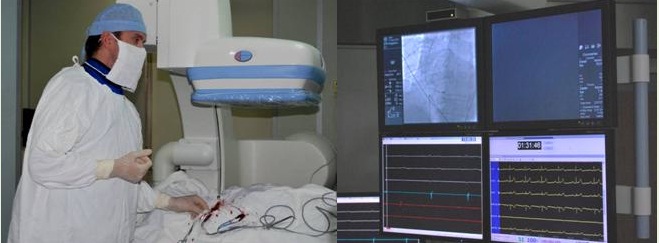
The specialists of the department develop new techniques of treatment arrhythmias and introduce them into everyday use.
The newly implemented services are:
- implantation of cardiac pacemakers, ICDs and CRTs;
- follow-up of the patients with implanted devices;
- programming of the implanted devices and prescription of antiarrhythmic medicines;
- implantation of a temporary pacing lead;
- implantation of a loop ECG recorder;
- consultations by a cardiologist and cardiac surgeon;
- transesophageal electrophysiological examination;
- reversal of supraventricular arrhythmia using transesophageal pacing.
Soon, the specialists of the department are going to apply such methods as
- radiofrequency ablation of arrhythmogenic areas in patients with atrioventricular tachycardia, atrial tachycardia, atrial flutter or atrial fibrillation;
- creation of an artificial atrioventricular block with implantation of a cardiac pacemaker in patients with atrial fibrillation;
- pulmonary vein isolation to cure atrial fibrillation.
Patients may undergo angiographic examination of arteries and veins:
- coronary catheterization;
- coronary catheterization with the use of medicines;
- aortography;
- bypass angiography;
- carotid and spinal cord arteriography;
- visceral angiography;
- renal angiography;
- limb angiography;
- angiocardiography;
- angiopulmonography;
- measurement of intravascular blood pressure gradient;
- cardiac catheterization in patients with congenital or acquired cardiac defects;
- splenoportography;
- cavography.
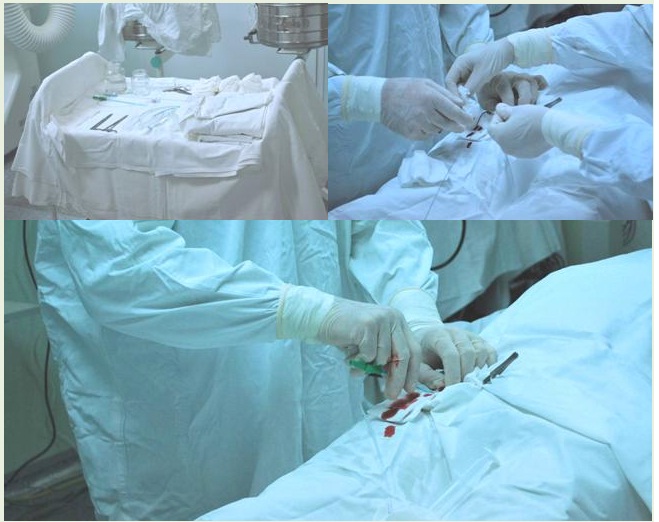
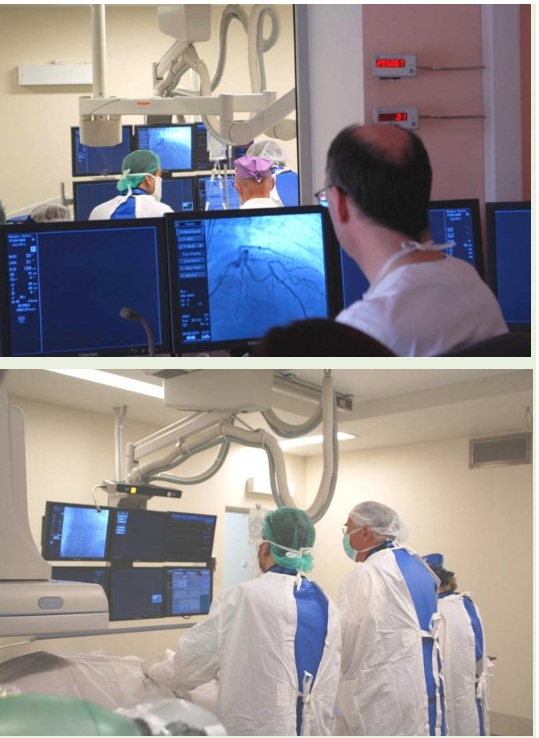
According to indications, the following surgery is carried out:
- coronary angioplasty;
- coronary stenting;
- visceral and peripheral angioplasty;
- visceral and peripheral stenting;
- venous cardiac catheterization;
- embolization of arterial and venous malformations, embolization of vessels, which feed uterine fibroids, embolization of arteries in case of chronic nasal, hepatic or any other bleeding, etc.;
- embolization and chemical embolization of hepatic and renal vessels in patients with tumors (including cases before open surgery with a view to reducing blood loss);
- portacaval shunting (TIPS – transjugular inrahepatic portosystem shunt) in case of portal hypertension of any cause. It may be a single surgery or a surgery before liver transplantation.
We have the most affordable prices in the CIS. For more information, please, contact us on +375 (17) 371-00-22, +375 17 371-00-26 or at Адрес электронной почты защищен от спам-ботов. Для просмотра адреса в вашем браузере должен быть включен Javascript.
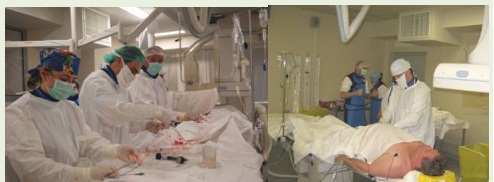
Do not hesitate to contact us on phones below and learn more about diagnosis and treatment of arrhythmias, indications for surgery, treatment options and consultations:
220087, Minsk, ul. Semashko, 8
Email: Адрес электронной почты защищен от спам-ботов. Для просмотра адреса в вашем браузере должен быть включен Javascript., Адрес электронной почты защищен от спам-ботов. Для просмотра адреса в вашем браузере должен быть включен Javascript.
Phone: +375 (17) 271-43-29, +375 (17) 271-31-04